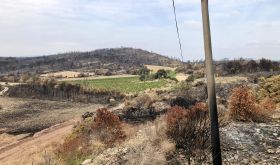First up – Naked Wines
If you haven’t heard of them, Naked Wines is a company that originally launched in December of 2008. By 2010 they had implemented a model which required customers to pay a monthly fee that could be used as credit towards wine purchases. The model allowed Naked Wines to take those monthly fees and to turn around and approach winemakers they’d like to stock private-label bottlings from. Because of the model, the company could offer a set price for a certain amount of wine before the wine was ever made. This meant that winemakers could use this to jump-start their own production AND it took all the marketing and sales work, resulting in a lower price for the consumer who had, in essence, prepaid for the wines. This was really attractive to consumers and has worked well as a model with Naked Wines expanding into the US and Australia. In 2021, the US became the company’s top market.
But Naked Wines hasn’t been insulated from declines in wine-industry fortunes. Last year, the company lost £9.7 million – 20% of sales – in the second and third quarter. They then adjusted expected earnings for 2024 and shares plummeted. As of 3 January, Naked Wines began running a discount of 50% on all purchases of six bottles or more for US customers. They’ve made it so that no subscription is necessary, and, for the UK, the company has offered 33% off for ‘angels’, which is what they call subscribers. Fifty percent is an incredibly hefty discount and it remains to be seen if this is going to help bail the company out or if it will exacerbate Naked's problems.
Next – the Netherlands
Following the announcement by the World Health Organization last year that there is ‘no safe level’ of alcohol – you can check our 12 December news video for more on that – and their recommendation that alcohol costs increase by 50% – the Netherlands has chosen to raise excise taxes on all forms of alcohol by 8.4% as of 1 January of this year. This is after Dagblad van het Noorden reported that prices on alcohol went up 16% in 2023. The Royal Association of Dutch Wine Merchants (KVNW) told Meininger’s International that they were concerned with consumers beginning to shop in France and Germany where prices can be half of what they are in the Netherlands.
In contrast, on 2 January, Thailand’s cabinet announced that they would reduce the amount of punitive taxes placed on wine. For imported wines, taxes were previously set at 45–60% of declared value and these will now be exempted. The country is also cutting excise taxes from 10% to 5% and halving the excise taxes on entertainment venues. The Bangkok Post reports that this is due to wanting to encourage tourism and hoping to host 34 million tourists in 2024.
Personally, I am happy to see at least one country lessening restrictions and penalties on alcohol. While I think it’s fine that people are choosing to drink less of their own volition, I think it’s incredibly damaging to businesses as well as to individuals’ social networks to governmentally restrict and penalise those who chose to drink. In the US, the vast majority of restaurants and wineries are family owned. Those families are less able to compete when they have heavy tariffs levied on them.
Finally, some news on Oregon's 2020 wildfires
I know that 2020 was more than three years ago but please bear with me as I will get to the news piece of this. Before that, I think it’s helpful to give some background.
In 2020, fires on the west coast of the US cost the wine industry 3.7 billion dollars. While California and Washington were affected, the majority of the damage was in Oregon. The Oregon fires were the most devastating in the state’s history: nine people died, thousands of homes were destroyed, and 1.2 million acres (0.5 million ha) burned. These fires took place in the last weeks before grape harvest and the Willamette Valley wine industry suffered horrible losses due to smoked and unsaleable wine.
The US Forest Service and Oregon Department of Forestry is tasked with keeping records on how every fire starts and, until late 2022, investigations were ongoing. It was then made public that 7 of the 10 largest fires were caused by downed Pacific Power lines, which had fallen due to the windstorms that hit the state on 7–8 September. Investigations found that the company had not maintained vegetation around their power lines and that they had failed to shut-off power when they received high-wind advisories.
A class-action lawsuit for 2,500 properties was brought against Pacific Power. The trial began in April of 2023 and it was brought to light that employees of Pacific Power had sent internal text messages during the fires about the cause of the fires … texts such as ‘God the fires near our service territories are right underneath our lines.’ These documents were originally withheld and Pacific Power called the fires ‘an act of God’ despite the fact that they had been advised of high winds and had conversations with then-Governor Kate Brown’s chief-of-staff and top fire officials which warned about the need for power shutoffs. Other power companies turned off power.
Pacific Power also destroyed their internal evidence of downed power lines and internal communications and KGW8 reported that during the investigation the only Skype messages remaining were found in a folder labelled ‘purges’.
In June 2023, Pacific Power was found guilty of negligence and the jury awarded the 17 plaintiffs $90 million dollars. The jury also pushed the liability findings to the nearly 2,500 destroyed properties saying that those homeowners may be eligible to collect on damages.
In July following the verdict, three Oregon wineries filed a lawsuit against Pacific Power for damages related to lost business and ruined product. PacifiCorp (owner of Pacific Power) attempted to dismiss these lawsuits outright but at the end of December last year, it was decided that the suits would proceed in court. The law firms of the three wineries who have individually sued Pacific Power are holding public meetings for any and all wineries affected by the 2020 fires, which, honestly, was all of them. Public meetings for Willamette Valley wineries are to be held on 23 January and 28 February at noon at the Atticus Hotel in McMinnville. Those who plan to attend should email santiam@bakerlaw.com beforehand.
This is a massive deal. Wineries have gone out of business or sold due to the losses incurred during the 2020 fires. If PacifiCorp is held accountable, it may increase their attention to fire prevention in the future – though, three months ago, they filed a request with regulators to limit their liability in future fires. It was not granted.
That’s all I have for you today. I will be back next Tuesday. If you have breaking news in your area, please email me at news@jancisrobinson.com.
On Tuesday mornings, Samantha Cole-Johnson, Senior Editor US for JancisRobinson.com, puts out a five-minute news broadcast on our Instagram page @jancisrobinson. As not all of our readers are Instagrammers, we’re publishing the transcripts with links embedded for further reading. This is also available on The JancisRobinson.com Podcast.
If you'd like more like this, become a member today. Members have access to more than 250,000 tasting notes, online access to The Oxford Companion to Wine and the maps from The World Atlas of Wine, in addition to a wealth of independent, ad-free, expert editorial updated six days a week.














